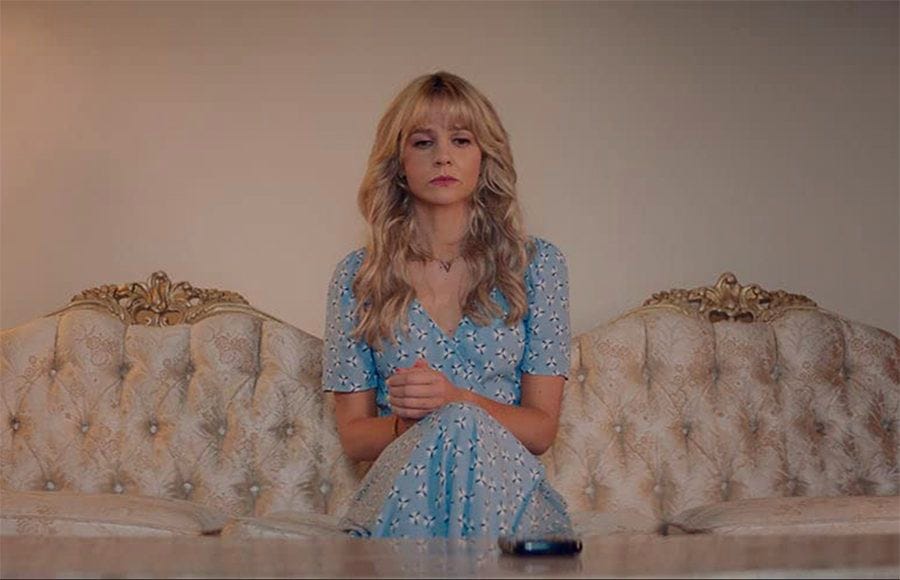'Promising Young Woman' Hides Under a Rom-Com
Candy-colored clothes. Nice guys. Montages. Pop music. Enemies-to-lovers. 'Promising Young Woman' has it all.
One of my (Fletcher) favorite things to analyze in this newsletter is stereotypes, from tropes to costumes, lurking in rom-coms. The nice guy, maybe Joseph Gordon-Levitt or Michael Cera, chasing after the fazed girl. Outfits that send you flicking through online shops, trying to find that gingham jumpsuit or this red turtleneck. Music that could rip a toe-tap out of anyone, even the snobbiest of snobs who despise romance and humor. Workaholics. Meet cutes. Enemies-to-lovers. Montages — so many montages.
A film that employs nearly all of these tropes is Promising Young Woman.
Promising Young Woman is not a rom-com. At times, it is funny. At times, it is romantic. But more often than not, Promising Young Woman is far too sickening to be romantic, far too morbid to be comedic. Cassie’s (Carey Mulligan) story is a tragedy — though I won’t spoil that divisive ending for any of you who haven’t seen it — rejecting the notion of a “happy ending” and offering some warped sense of closure instead. Again, not a rom-com. And yet, Emerald Fennell coats her movie in a syrupy romantic comedy glaze, dolloping rainbow-colored clothes as springles and stereotypical “nice guys” as frosting. But beware: this candy-coated treat is stuffed with razor blades.
Essentially, in order to trick viewers into trusting a perilous story, unsafe men, and withering relationship, Fennell constructs a facade out of rom-com tropes. A movie like this could just as easily stick to thriller tropes, maybe even horror. No — Fennell wants us to fall for everything. She wants us to believe we are comfortable, as rom-coms often do, before she pulls the safety net out from under us.
In Promising Young Woman, men are pests. They crawl around shoddy bars, crawling under tight dresses and jeans strapped to unassuming young women. And once they infiltrate, the women are stuck living with this termite crawling around in their memory, traumatizing them for ages. Worse, they breed; men inspire cruel behavior in their peers, their younger brothers, their sons, sprawling until they’re an unstoppable force of disgusting harassment. Some of the pests are tiny, handled with a shoe smash, a swipe of a tissue, and a quick shudder. But others are big. Rats. Uncontrollable, horrifying, life-ruining rats. Once you’ve got one, when will you be safe again? Among the termites, rats, and roaches is Max Greenfield. Hey, isn’t that Schmidt from New Girl? I must be mistaken — he’s not a pest! He’s just a goofy dude.
But as Joe in Promising Young Woman, even cutesy Max Greenfield is, indeed, a little roach. He’s just gussied up as a loveable goofball, a villain masquerading as the hero. Other familiar faces pop up: Adam Brody of The OC is the first to take Cassie home, an earnest “nice guy” who tries to abuse Cassie as she lies drunk, helpless on his bed. Then there’s Superbad’s Christopher Mintz-Plasse as a nerd, just like the one in Sixteen Candles — the one who just gets to “have fun” with a drunk girl when she’s passed out in his car.
Fennell purposely weaponized these nice guys, telling them all to act as if they were the protagonist of their own romantic comedy. "It was like, 'This is the beginning of a romantic comedy and you're the nice guy who just saved this girl from your skeezy friends and you're going to sleep together and then you're both going to wake up and — oops! — neither of you are going to remember what happened last night," she explained.
For any rom-com lovers, that sounds familiar.
Then there’s resident goofball Bo Burnham, who plays Cassie’s trusty boyfriend Ryan, a pediatric surgeon. I just rewatched and wrote aboutThe Wedding Planner, truly a classic, and I can assure you that there are a total of zero differences between Matthew McConaughey’s role in that film and Bo Burnham’s role in this one. They are golden, charming boys with a sweet career — but they keep lying. Of course, Cassie and Ryan have a La La Land-Esque meet-cute in a bright coffee shop. She spits in his coffee. He drinks it anyway. Cut to: Cassie and Ryan in a pharmacy dancing to Paris Hilton’s “Stars Are Blind,” Cassie and Ryan going on more dates, Cassie and Ryan laughing, Cassie and Ryan in his bed. It’s an endearing little montage! And it’s really too bad that she can never trust him for what she’s about to uncover.
Cassie’s closet and hair are my favorite detail attached to the rom-com genre. She’s a vengeful bounty hunter out for blood, but she wears pink eyelash sweaters and floral Reformation dresses. She’s certainly got a J. Crew credit card, just like J. Lo in The Wedding Planner or Zoey Deutch in Set it Up. Her hair is feathered like Farah Fawcett’s, donning curtain bangs and lovely layers, often braided and tied with a ribbon. Even Zooey Deschanel herself would be jealous of that lavender gingham jumpsuit.
Promising Young Woman is not a takedown of the entire rom-com genre. Rather, the movie pushes us to grapple with these tropes that may have more crawling beneath the surface. The manic pixie dream girl trope may seem silly, but perhaps it’s more harmful than it is endearing. If a guy is rabidly chasing after some girl, take it at face value: that’s stalking. It’s not always men on the oppressor side and women as the victims, however, as it may appear in Promising Young Woman.
Just like Promising Young Woman, the rom-com genre isn’t perfect. As sunny and cheery as the posters may look, a few things are off-track in Pleasantville — we need to stop brushing these little bits off with a laugh. Rom-coms are easy pop culture nuggets to consume because they fall so easily in-line with society’s idea of man-woman-marriage, full of hijinks along the way. But when weaponized, this genre is far too dangerous to trust. Fennell has successfully turned the rom-com against itself.
-Fletcher







